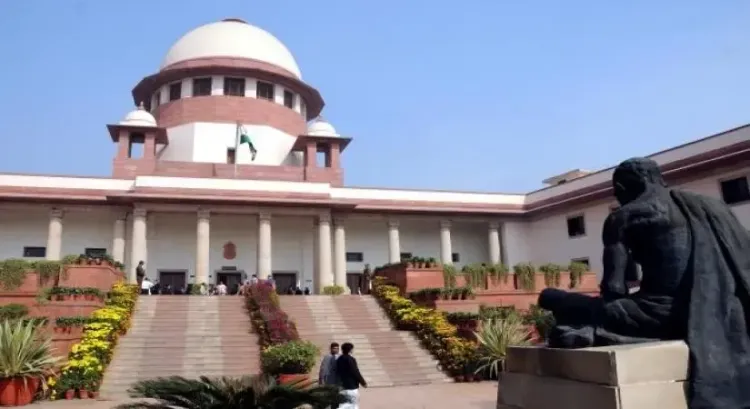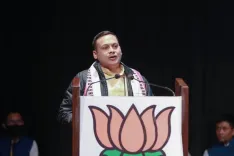Supreme Court Raises Alarm Over Violence Amid Waqf (Amendment) Act Protests, Schedules Further Hearing

Synopsis
Key Takeaways
- The Supreme Court is concerned about violence related to the Waqf (Amendment) Act protests.
- Further hearings on the constitutional validity of the amendments are scheduled.
- The Court is considering interim orders regarding waqf properties.
- Several petitions contest the Act's legality.
- The government argues the Act benefits poor Muslims.
New Delhi, April 16 (NationPress) The Supreme Court on Wednesday voiced its concern over the violence occurring amid protests against the Waqf (Amendment) Act, 2025.
"One aspect that is very troubling is the violence that is happening. Once the matter is before the court, it should not transpire," remarked a bench led by CJI Sanjiv Khanna.
The bench, which included Justices Sanjay Kumar and K.V. Viswanathan, scheduled further hearings on the pleas challenging the constitutional validity of the amendments made to the Waqf Act, 1995, for Thursday at 2 p.m. This includes discussions on the Union government's arguments regarding the issuance of an interim order.
During the hearing, the apex court indicated its intention to issue an interim order stating that properties previously designated as waqf by court decree or otherwise will not be denotified due to the recent amendment.
It suggested that the provision of the Waqf (Amendment) Act, 2025, which states that a waqf property will not be recognized as such while the Collector conducts an inquiry into whether the property is government land, should not be enforced.
Additionally, the CJI-led Bench proposed to issue an interim order stipulating that all members of the waqf boards and Central Waqf Council, excluding ex-officio members, should be Muslims.
Solicitor General Tushar Mehta contested the issuance of an interim order and urged the CJI Khanna-led Bench to allow the Union government to present its case before any order is made. He stated that a response would be submitted within two weeks if a notice is issued to the Union government, and that the matter could be heard daily.
At the beginning of the hearing, the top court stated: "There are two aspects we would like both parties to address. First, should we entertain writ petitions or refer them to the High Court? Second, what do you (petitioners) wish to argue?"
Numerous petitions have been filed in the Supreme Court challenging the constitutional validity of the recent amendments to the Waqf Act, 1995.
Following the legislation's passage in Parliament during the first week of April, the Congress announced its intention to contest the Waqf (Amendment) Bill (now an Act after Presidential assent) in the Supreme Court, claiming it undermines the basic structure of the Constitution and is designed to polarize and divide the nation on religious lines. Conversely, the government has asserted that millions of impoverished Muslims will benefit from this legislation and that it does not harm any individual Muslim.
In his petition to the apex court, Congress MP and party whip in Lok Sabha Mohammad Jawed argued that the amendments infringe upon Articles 14 (right to equality), 25 (freedom to practice and propagate religion), 26 (freedom for religious denominations to manage their affairs), 29 (minority rights), and 300A (right to property) of the Constitution.
Another plea from All India Majlis-e-Ittehadul Muslimeen (AIMIM) chief Asaduddin Owaisi asserted that the contested amendments are ex facie violative of Articles 14, 15, 21, 25, 26, 29, 30, and 300A of the Constitution of India, describing them as manifestly arbitrary.
Several additional parties, including the Association for Protection of Civil Rights, AAP leader Amanatullah Khan, Maulana Arshad Madani of Jamiat Ulema-i-Hind, the All India Muslim Personal Law Board (AIMPLB), the Social Democratic Party of India (SDPI), the Indian Union Muslim League, Taiyyab Khan Salmani, and Anjum Kadari, have submitted petitions questioning the constitutional validity of the provision.
In response to the petitions that seek a stay on the implementation of the Waqf (Amendment) Act, 2025, the Union government has filed a caveat in the Supreme Court.
Moreover, various BJP-led states, including Haryana, Maharashtra, Madhya Pradesh, Rajasthan, Chhattisgarh, Assam, and Uttarakhand, have approached the Supreme Court to defend the Waqf (Amendment) Act, 2025.
The concept of ‘Waqf’, grounded in Islamic laws and traditions, pertains to an endowment established by a Muslim for charitable or religious purposes, encompassing mosques, schools, hospitals, or other public institutions.







